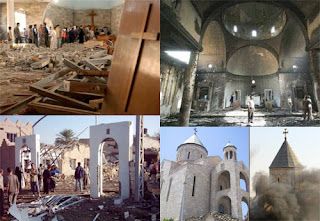IRAQ’S CHRISTIANS FACE EXTINCTION: DAPHNE ANSON
http://daphneanson.blogspot.com/
Slaughter of the Innocents: Iraq’s Christians face extinction
In Egypt and in Pakistan Christians are being brutally persecuted. And so, too, in Iraq, as the following account (10 December) by a senior church figure working in Syria with Christian refugees from Iraq shows.
Released by the Barnabas Fund, and sent to me by reader Ian G (thank you, Ian), it reveals the desperate plight of the Christians still inside Iraq. Their situation has worsened since the major attack on a church in Baghdad in October, and in the wake of Al-Qaeda’s statement that all Christians and Christian institutions make “legitimate targets”:
 |
| Plight of Iraqi Christians; photo collage: Middle East Fellowship |
“Their conditions are no longer bearable. The people are living behind locked doors, they are compelled to take long leaves of absence from work, in Mosul and other cities, as a result of the dangers they face at work.
The universities are almost empty of Christian students, as are the schools. In some of the cities even the streets are almost empty of Christians.
It is as if they are in prison: without work, without study, without Church meetings. Fear rules over all situations and in all places.
Threats and insults are daily occurrences, and offensive graffiti is daubed on the walls of the homes of these innocent people.
There is no getting around this problem nor is there a solution to it. The people are deprived of everything that could bring security to their lives; all they can do is depend on God’s mercy or leave for the north. However, travelling to the north requires great financial means for paying the very high rent of homes there, and meeting the cost of living.
If a Christian wishes to rent out his house and leave, the terrorists will force the person renting the house to pay the rent to them, because according to them this house is theirs by right. And, if he dared to sell it they would threaten the person who bought it, so in the end all the money would go to the terrorists.
Here are some examples of people’s stories:
A family in the north received a knock at their door at night, and the head of the household went to the door, and found a bird, slain, nailed to the door. The message was clear: you will be slain like this bird.
Saad and Raad, two young men working in the industrial area in Mosul as blacksmiths, used to pay 300,000 Iraqi Dinars a month to the terrorists in order to be spared their lives. This however, in the end, did not prevent them from being killed in their workshop, leaving eleven people unsupported.
A 26-year-old man, who was working in a mini-market, had his shop entered by terrorists demanding some items. He was fired upon and killed, without warning. This took place in broad daylight in Mosul, at the beginning of this month (December 2010).
Many are thinking of leaving these tragic circumstances, but without any means of doing so.
This month three families have arrived from Mosul, fleeing the extremely difficult circumstances, and they are now in Hassake and Kamishly.
There are many other horrific stories of tragedy, which could fill pages and pages. They tell of terrorism, fear, unbearable living conditions and children being threatened, having their very lives coloured with deep blackness.”
Dr Patrick Sookhdeo, the Barnabas Fund’s international director, has called for immediate international intervention to help Iraq’s Christians, and for prayer on their behalf:
“This Christmas the Christians in Iraq face an unfolding tragedy. The past seven years of war have seen their community devastated. Now they face a wave of attacks that has reduced many of them not just to abject poverty, but also to terrible fear.
A senior Iraqi Christian leader recently asked if the time has now come to evacuate the entire Christian community from Iraq. Others have suggested that its only future lies in an independent homeland.
What is crystal clear is that the international community cannot wash its hands of this beleaguered minority. Intervention must happen urgently. Intervention should be now.”
Comments are closed.
